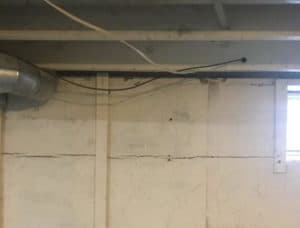
Originally posted 11/26/2018, updated 2/11/2021
Freezing temperatures cause damage to everything- even materials we tend to view as permanent. These include the materials that we depend on to keep us safe and comfortable in bad weather; wood beams can rot, nails can rust, and concrete can decay.
Your home can develop foundation issues any time of year, but there are particular risks that develop in the winter months.
Acculevel has been helping Midwest homeowners repair their foundations since their start in 1996. Family-owned and operated, we have restored strength and stability to more than 30,000 homes damaged by the elements. We understand that your home is your greatest investment, and we strive to answer any and all questions you ask with honesty and transparency.
In this article, we’re going to explain how freezing temperatures can damage a foundation and how to recognize the signs in your own home. We’ll also recommend additional resources for you that explore repair methods and provide actions you can take to reduce your risk of foundation damages.
When water freezes, it forms ice. This sounds like a stupidly obvious statement, but I want you to think about how water freezes. It doesn’t freeze into ice that is the exact same size and dimension, right? Water expands as it freezes.
There are two ways that ice can damage your foundation, depending on how the water freezes. If it forms a piece of ice separately from the soil, it can take up too much room and push against everything around it- including your home. This push is called a frost heave, and like hydrostatic pressure, it can create enough force to crack the foundation.
Want to know more about these industry terms? This article gives thorough definitions of these threatening winter phenomena.
The other way ice threatens your home is through adfreezing. This is what happens when the ice forms within the soil. Because this type of ice includes dirt, it often adheres to your foundation where the ground and the foundation meet. When this ice melts, it’s directly against the concrete and seeps into it (concrete is a porous material).
So now you have icy ground stuck to your foundation, with a bit of snowmelt working its way into your home. Then it freezes again- only this time, some of the water that freezes and expands is inside your foundation. Concrete isn’t flexible- when forced to expand, it’s going to crack.
 This photo was taken by an Acculevel project advisor during a free estimate appointment. This crack in the basement wall is a sign of a wall beginning to bow.
This photo was taken by an Acculevel project advisor during a free estimate appointment. This crack in the basement wall is a sign of a wall beginning to bow.
How much water seeps into your basement in the winter is largely dependent on how much it snows or rains. Rain tends to make its way indoors more rapidly than ice, naturally. But if you have water in your basement, your first concern probably isn’t going to be which type of precipitation it is.
If your basement has flooded in the past, it’s likely to do so again. We strongly recommend that you install water drainage as soon as you can manage it; weather patterns are erratic, and you never know when a break in temperature will send melting ice water into your home’s foundation.
This article reviews the major types of foundation cracks, as well as how urgently they should be fixed.
Want to know more about waterproofing options? We explain the various types of water drainage, their pricing, and how to calculate your costs here. Also, this blog explains why you should waterproof your basement in the winter.
Do you think your foundation is settling? This article gives you the signs and symptoms you should watch for.
Have you noticed something that seems “off” to you, but you can’t identify what it is? We encourage all of our website visitors to take advantage of our interactive tool:
If you live in Indiana or the surrounding states, contact Acculevel. We provide free written estimates to all of our customers. Contact our office, and one of our friendly staff will schedule an appointment for you with one of our experienced project advisors. He or she will evaluate your house and its symptoms, then recommend the best course of action for you, to keep your home strong and healthy for years to come.
Acculevel’s goal is to do the best and most thorough repair possible, to protect and maintain your home. We know that allowing our employees into your home demonstrates trust, and we intend to repay that trust with the absolute best in customer service. Acculevel is accredited by the BBB, has an A+ rating, and average 5 stars on customer reviews.
[DISPLAY_ULTIMATE_SOCIAL_ICONS]